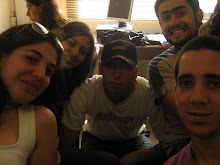The title above was the one chosen for the conference that we had the chance to attend, on Wednesday, May 13, 2009. Miss Tracey Mansell was the host of this conference, and the lecturer was Mr. James Stayner, from England. In general, the lecture was about how political campaigns are being held these days, and what the different types of media used are, taking into consideration the way messages are sent and received; the way the audience is being informed and influenced.
It all started with a simple idea: Informing people is influencing them. And this is exactly true, for if people aren't affected by the message that is being sent to them, then this message becomes useless. And when it comes to elections, the voter is considered to be a target to be influenced than being a decision-maker that is informed. For example, we can see how some political campaigns can change one's opinion just because they are able to touch the deepest part in him/her (Affect his/her emotions, the way he/she thinks, or even the morals and ethics he/she have been raised on).
Since the 1950s, the role of media in the domain of politics has increased, and nowadays, the American way of creating ads has spread all over democratic countries. But why don't these countries try to develop their own ways of creating ads? It is true that American ads have been the best and the most influential of all the types of ads, but that doesn't mean that any other type won't excel the same way.
Moreover, in some countries, we may not see types of ads that differ from the American ones, but we can notice the variety in using different campaign strategies by different political parties, each affecting the relationship citizen-political parties in its own way. How do these campaign strategies affect this relationship? In fact, by using the media, political parties are able to mobilize the citizens; able to help them make up their minds about who to vote for and the reasons behind it. From here, we can deduce that elections have no meaning without media, for it is the basic element that manipulates the citizens.
As a matter of fact, in the 19th century, like in Britain for instance, election campaigns used to be so loud and crowded with people. But later on, technology became one of the most important elements in political campaigns, making them easier and spread wider (Starting from the 1920s, there was the radio then the television). Furthermore, technology allowed politicians to be present among us, in our homes or the places that we spend most of our times in. Imagine having the sound and the image of a candidate in your living room, where you don't move your eyes away from the T.V; not even a bit. So what if these politicians became present in every talk show we watched and every T.V. program? Well, that's what happened in Europe and America, where talk shows became everywhere, influencing the younger generation mostly. And Lebanon isn't an exception in such a case.
We can't deny the fact that election campaigns are taking over T.V. programs, where all we can see are the politicians trying their best to appear as much as they can, allowing citizens to know more about them, and who knows, maybe those candidates could win some voters on their side. In Lebanon, citizens would go for the politician who offers the best services and the most suitable plans for their needs.
Unfortunately, election campaigns didn't stick to billboards, talk shows, and radios. In fact, and mostly noticed during Barack Obama's campaign, things have spread in an unbelievable way till they became a part of the internet networks as well. Why the internet? Because as we all know, that widespread invention has the younger generations as the majority of its users. As for Lebanon, political parties have started using blogs and websites as new ways of communicating with citizens and transmitting their messages. As well as, students and political activists have increased the usage of blogs in order to exchange information and express their own opinion about the political party they support. And such a phenomenon isn't only taking place inside the country, but all over the world, to an extent that the number of blogs has reached 150,000,000 blogs worldwide. So can you imagine the number of people being informed and influenced by these blogs?
Blogs really facilitate communication among people who have similar or even opposite point of views concerning certain topics.
In addition to what has been mentioned above, let's take for instance the former U.S. President John F. Kennedy. This man has become a pro at his time in using the T.V. as a way to transmit his messages to the citizens, and the same is taking place today in Lebanon: political parties are becoming pros in using T.V. shows and programs, as well as the internet in order to influence the citizens and increase the number of their supporters.
And a question is to be asked: what do you think the reason behind Lebanese citizen's voting is? To be honest, we can't deny that a person votes because of being influenced by a political campaign or in order to be committed to the political party he/she has always been committed to. But what about those who vote based on their familial or religious belongings? I believe those people do exist, and they may not always be any benefit for the way elections are going on. In fact, they may be a major obstacle.
And last but not least, political parties have been adopting certain signs or logos in order to represent themselves among the citizens. And the reason behind the usage of these signs is for these parties to find a certain way to become more familiar among citizens, and influence them fatser and better. And such an effect may not be obtained from now till the elections come, but sooner or later, it will be. Sooner or later, voters will get used to these signs, and maybe influenced by them as well. So here's a new way of mobilizing supporters and gaining new ones (Maximizing voters).
Posted by (E.M.)





.jpg)

.jpg)
.jpg)
.jpg)
.jpg)
.jpg)
.jpg)








 Posted by (E.M.)
Posted by (E.M.)


























